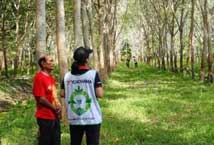
Yokohama Rubber has recently partnered with the Rubber Authority of Thailand (RAOT), a state enterprise under the jurisdiction of Thailand’s Ministry of Agriculture and Cooperatives, to provide economic support for natural rubber (NR) farmers in Thailand and to improve traceability of the supply chain. The Memorandum of Understanding (MOU) signed between the two parties follows a survey on NR plantations in Surat Thani, southern Thailand; conducted by Yokohama Rubber’s local subsidiary, Y.T. Rubber Co. (YTRC), it aims to survey some 500 farmers by the end of 2021, the results of which will be used by YTRC to study the common issues facing NR plantations.
Thailand is a major producer of NR – aside from contributing to sustainable operations in the NR chain, Yokohama Rubber has been conducting joint rubber research with universities since 2013, while also promoting widespread use of “agroforestry” that contributes to more stable income for the country’s rubber farmers and holding regular exchanges with NR suppliers. Meanwhile, YTRC has introduced a purification system that recycles water used at its plant as part of its effort to protect the natural environment and maintain a strong relation based on trust with local residents.
The demand for tyres and its core raw material used in production – NR – is expanding steadily as the world’s population grows and mobility technologies become more advanced. However, the growing demand has led to a host of problems, including unlawful deforestation, land exploitation, human rights violations, and adverse effects on biodiversity, especially in countries and regions of production.
Yokohama Rubber hopes to resolve these problems with its involvement in the Sustainable Natural Rubber Initiative (SNR-i) advocated by the International Rubber Study Group and in the Global Platform for Sustainable Natural Rubber (GPSNR) launched in October 2018. Additionally, Yokohama Rubber is endeavouring to achieve the Sustainable Development Goals (SDGs) established by the United Nations in 2015 – activities promoting sustainable raw material procurement are part of the SDGs.
